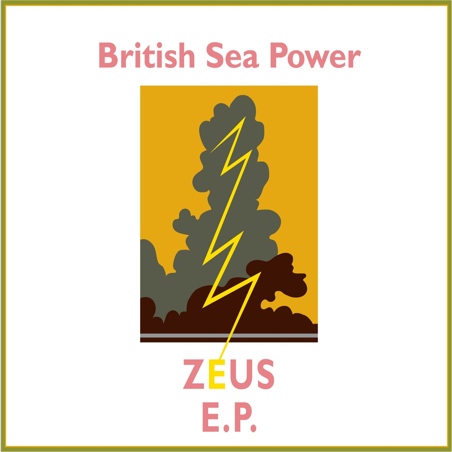British Sea Power, the UK quartet that made an impressive debut with 2003’s The Decline of British Sea Power, are back with their newest EP, Zeus, which precedes their fourth full length due out next year. From their debut release to their last LP, 2008’s Do You Like Rock Music?, BSP have undergone a bit of growth in the scale of their sound, going from a more pedestrian indie rock approach to a style more heavily reliant on synths and strings to expand their boundaries, and in the process have received quite of bit of comparison to bands such as Arcade Fire and U2 because of it. It’s safe to say that those comparisons are indeed a bit unfair, as even on their first record, the flirtations with stadium-sized anthems were apparent before the additions in instrumentation, but it’s in Zeus that the band begins to tinker with their music stylistically and thematically while pushing some new buttons in their effort to do so.
The title track is a boisterous affair surrounded by a swirling guitar line and pulled into a sunlight not necessarily heard on their full-length release from two years ago or their regional release from 2009; this disc carries with it a tone missing from Do You Like Rock Music, and Man of Aran, whose austere atmospheres began to pull the boys from Brighton dangerously close to a thematic cliché that started to signal that perhaps the band was stuck in a dark, dystopian place. This first track greets us with an upbeat swing that launches us into Yan and company’s familiar expansive sound on the bows of some soaring strings, while the lulls of beeps and bloops fade away the song into intervals. Everything we know British Sea Power for is in this song save for the stadium itself to put it in, and the post-bridge buildup is done flawlessly to provide a riveting finale. The lyrics are far from strained and come off quite abstract and rather, well, intangible. The band seems to be having a ton of fun bouncing between references to Soviet leaders, English chefs and children’s authors, and the disconnected nature of it all really invokes one hell of a weird dream, but the end result is an enjoyable seven minute ride up, down, and around their world that had me agreeing with the repeated sentiment; “I really hope that we can come here again.”
“Cleaning Out The Rooms,” while much too long, is blanketed by a light set of velvety strings with the slight drizzle of a piano chasing them along, creating a starry, staccato melody that begins to show a relatively different side of the band. The song flat lines at around the three minute mark, though, as any sort of change in direction would have prevented it from lulling me to sleep, but it continues on in a never-ending circle spinning around itself with no real intention to reach anywhere in particular. Perhaps this is a resonant effect of their fine instrumental soundtrack from a year ago, but a more honed-in approach would have been better suited for this otherwise elegant piece. The record takes a turn for the plainly romantic with “Bear,” depicting a lover left behind while waiting “for the world to catch (her) up,” or so the narrator would like to convince us. The instrumentation is thin until the song breaks into a Muse-esque synth/bass section before tapering off with a buzz. “Pardon My Friend” follows suit, and comes off as if “Bear” were taken and put in front of a funhouse mirror; it’s contorted and creeps along uncontested before “Mongk,” with its shrieks and strong sense of tension, barrels into view. This is the closest BSP get to anything as luridly bleak as what Rock Music had to offer, but never did that album become as frantic. And never has any of their music ever come close to “kW-h,” the absolutely silly vocoder-session gone wrong, nor should it ever again. I suppose you have to commend them for trying, but the end result here just doesn’t come close to anything worth mentioning. The bonus track provides eight minutes worth of sweeping string loops against a pulsating rhythm while the vocals swoon and blend deep into the background; at one point, an acoustin guitar finds its way into the cut about seven minutes in and disappears without a trace, a perfect way to end a patchwork EP that showed me as much promise as it did impending disappointment.
At a stout eight tracks, (including the bonus cut) three of which eclipse seven minutes apiece, this disc provides a long, sturdy bridge to BSP’s forthcoming 2011 LP, Valhalla Dancehall, and marks an overall satisfactory showing of stylistic elasticity from the band that should excite their fans as they continue to deliver their familiar but individualize brand of power pop.

